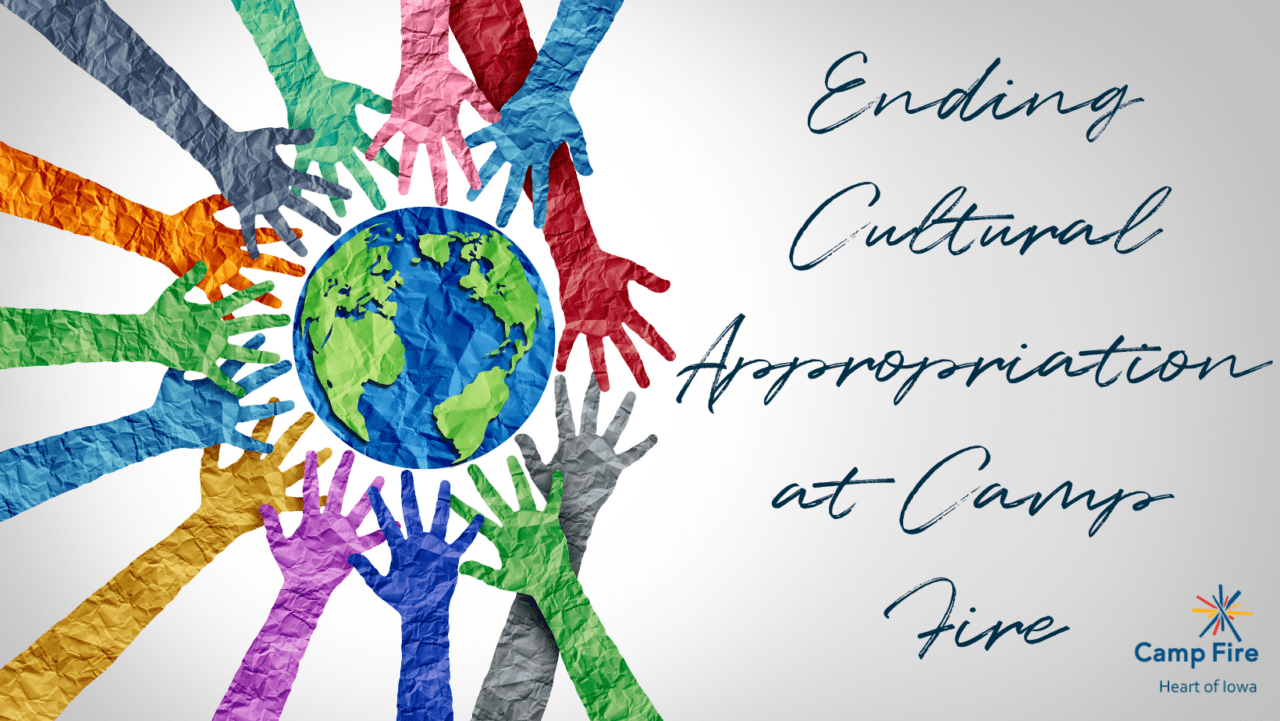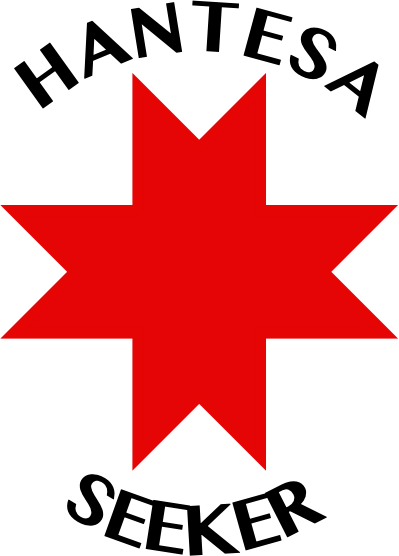
Addressing and Ending Cultural Appropriation at Camp Fire
In April 2022, Camp Fire National Headquarters identified new strategic priorities for all Camp Fire affiliates. Included in this new strategic direction was a commitment to ending cultural appropriation in Camp Fire programs. Camp Fire Heart of Iowa and Camp Hantesa have, for many decades, been a leader in inclusive practices, including having modified program activities, practices, and language numerous times throughout our history as our knowledge has grown.
With this renewed commitment, our staff, board, and advisory teams have taken on the important task of a full organization and program audit for culturally appropriative practices. In this post, we share our process and the major changes which have been implemented within our organization.
First, what is cultural appropriation?
Cultural Appropriation refers to a particular power dynamic in which members of a dominant culture take elements from the culture of people who have been systemically oppressed by that dominant group.
The adoption of these elements from another culture typically occurs without the consent of the people who belong to that culture and who have been historically marginalized.
Acts of appropriation and their implications are not determined by the intent or awareness of those engaged in such acts but are instead shaped by and, in turn, shape the social, economic, and political contexts in which they occur.
SACA Task Force:
Last spring, the Heart of Iowa council was chosen as one of only a few councils nationwide to pilot the new self-assessment for cultural appropriation (SACA) tool. A task force of alumni, staff, and supporters was convened to lead this process and included former campers, seasonal staff, professional staff, board members, and club leaders.
This task force used the SACA tool—a checklist and set of guiding questions—to look at samples of camp and club curricula, activities, ceremonies, recognition items, and more.
The tool asked the task force to consider:
- Language and names that either are in Indigenous languages and/or mimic the sound of Indigenous languages present in camp names, songs, buildings, etc.
- Songs and stories that may depict Indigenous communities and individuals in stereotypical ways.
- Rituals that may include practices traditionally used in sacred and social ways by Indigenous communities.
- Iconography and symbols used in recognition items, signage, etc., that may take or draw from an Indigenous cultures’ intellectual property, traditional knowledge, and cultural expressions.
- Program activities that may reference or mimic those of Indigenous cultures.
First Steps
The task force identified several areas of concern, many of which have already been addressed through minor program changes, including:
- Use of Indigenous names in honors, naming of buildings, and ceremonies.
- Songs and stories which reference/mimic (often fictional or stereotyped) Indigenous languages, people, or events.
- Ceremonials that mimic Indigenous practices, including the use of headdresses and other dress (ceremonial gowns, headbands).
- Indigenous iconography and symbols used in honors and other places throughout camp. See our recent post about the retirement and removal of the totem pole at Camp Hantesa.
Next Steps:
The second phase of this process includes more significant program modifications, which are already well underway! With the support of our advisory group’s input from Camp Fire youth, we have:
Developed a Land & Language Acknowledgment:
A Land Acknowledgement is a formal statement that recognizes and respects Indigenous Peoples as traditional stewards of this land and the enduring relationship that exists between Indigenous Peoples and their traditional territories.
Why have a land acknowledgment? To recognize the land is an expression of gratitude and appreciation to those whose territory you reside on and a way of honoring the Indigenous people who have been living and working on the land from time immemorial. It is important to understand the long-standing history that has brought you to reside on the land and to seek to understand your place within that history. Land acknowledgments do not exist in a past tense or historical context: colonialism is a current ongoing process, and we need to build the mindfulness of our present participation. It is also worth noting that acknowledging the land is an Indigenous protocol (http://www.lspirg.org/knowtheland).
Will Camp Hantesa be renamed? This is perhaps the most common question/concern we have heard from our alumni; however, at this time, we have no plans to rename Camp Hantesa.
Read our full land and language acknowledgment here.
Renamed the Gypsy Honor:
Some of the most notable honors at Hantesa are those within the camp craft progression. The fourth honor in this progression has, for many decades, been known as the “Gypsy” honor.
The Gypsy honor was originally developed in the 1930s by the National Camp Fire Office, abandoned, and later reinstated. Camp Hantesa, however, continued to utilize this program throughout this period of change, even when the national office did not sponsor it. Achieving the Gypsy honor marks a major milestone for Hantesa campers demonstrating their mastery of fundamental outdoor skills and commitment to harmonious living with nature.
Though “Gypsy” can be used to refer to a traveling, nomadic, free-spirited person, in other parts of the world, it is used as a racial slur for Romani people. Therefore, with input from our Program Advisory Team, participating youth, and other Camp Fire supporters, we have made the decision to rename the honor while retaining the same ceremony, songs, and traditions that make it special to so many. Beginning summer 2023, the honor has been renamed “Seeker.”
This name was chosen following much brainstorming and discussion with Camp Fire alumni, youth, and staff (seasonal and professional) and was chosen from more than 20 options initially proposed. The traditions of a red star, red paisley tie, lanterns, and songs/pledges/desires will continue for many years to come!

Prepared to redesign the Hantesa honors:
This fall, our alumni that have hand designed and painted the Hantesa honors for many years will utilize a new design guide from our National Headquarters to reimagine and redesign the emblems and awards given to our summer campers as they develop in various activities. These new designs will honor the past by utilizing common coloring, shapes, and materials while looking toward the future with new symbols and iconography! We look forward to sharing these exciting new designs as they develop.
We remain committed to transparency and stakeholder input as we make changes to some of these traditions so beloved by generations of campers. Though we know changing these words, names, and practices will be challenging and may come as a disappointment to some, we believe this work is vital to truly living our mission and values as a leader in the inclusive youth program space.
We are so grateful for all the support our alumni have shown as we continue on this journey. As all our campers, staff, and alumni know – Camp Fire’s most treasured tradition has always been – and continues to be – the inclusion and understanding of all people. We are honored to carry on this tradition with our youth to create more welcoming and meaningful programs for all!
If you have any questions about these changes, please contact Owen Ballard, Development & Operations Director, at oballard@campfireiowa.org.




